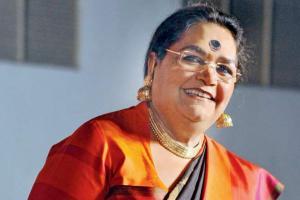Posthumous fame doesn't attract Usha Uthup who wishes for recognition while she is up and about on stage

Usha Uthup
Seated across Usha Uthup for this interview, our tongue is set for a hint of toil. Far distanced from pronouncing alphabets in any other way than guided by the English language, we're being given tutorials on rolling our tip to emphasise R, or placing it between our teeth to tweak the way we use N. "In Bengali, there is no 'a'. It's either 'aap' or 'aup'. Similarly, Malayalam has three 'Ns', which is why it is more complicated. So if you go to Kerala and pronounce N in only one way, they'll [laugh at you]," says the veteran. With a repertoire that boasts songs in an array of languages, Uthup can put any other singer to shame. It's only natural then that we seek to understand what she hopes lovers of Bollywood music would know about singing in other dialects.
ADVERTISEMENT
"If people realised why others speak in a particular way, they'll learn something instead of making fun of it. People need to understand the workings of every language. I'm a Tamilian. So, I spoke Tamil [at home]. I learnt English because I went to an English medium school. Hindi was my second language, Marathi the third and French the fourth. I realised, when you sing in someone else's language, the song always has another spark."
Her pronounced voice notwithstanding, Uthup credits her love for various dialects as reason behind the opportunities that came her way. "I've done shows across Assam, and in Bihar, MP [Madhya Pradesh] and Gujarat. How would I have done it if I didn't know their language?" questions the singer, who also conducts workshops to guide willing students understand the nitty gritties. Two of her students, she confesses, are the industry's revered: Sonu Nigam and Shreya Ghoshal. "I conveyed [my learning] to them. Today, if you go to Karnataka, every second song belongs to them."
A glimpse at Uthup's diary is certain to reveal how sought-after she is, several decades into her career. Jumping from city to city as she continues to enthral music aficionados with her renditions, she condenses the experience of live gigs into a pithy but powerful "magical". "There is no second take. You have to be more alert and focused; nakhras don't work." What also doesn't work, we quickly learn when watching her perform at the India Music Summit, is a repetitive rehash of her old renditions. Uthup loves to experiment with the new. Change, she admits, is the inevitable that people must get accustomed to, to prevent getting obsolete.
"I'm not a sad person. I'm not among those who will say, 'Humare zamane mein gaane kitne achche the. Ab kya ho gaya?' Today's songs are also good, they only need to be given a chance." Pointing out that not all art is always instantly applauded, she draws from her experience when stating, "When I sang [Ramba Ho], people said, 'Kya faltu gaana hai.' No one thought particularly well of Hari Om Hari either, but, today, they are classics. When RD Burman was in his prime, nobody liked him as much as they do now. That's so sad. I always say, give me a rose while I'm alive, so that I can still smell it. What's the point of calling [me] a great singer after I'm dead?"
Always a student of the craft, Uthup admits she heads to shows of other artistes when time permits. "I want to see where I stand, and what I can learn from them. I see everyone's show, but often find them [repeating] my acts, anyway. If I could wish for something, it would be to be as learned as the younger lot. With all due respect, if the old [revered] singers were born today, they'd have to work hard [to make a name]. That's because the young singers are educated in music, and so good. I wish I had the opportunities to learn, like they have. But, what I do on stage is something only I can do."
Catch up on all the latest entertainment news and gossip here. Also download the new mid-day Android and iOS apps to get latest updates
 Subscribe today by clicking the link and stay updated with the latest news!" Click here!
Subscribe today by clicking the link and stay updated with the latest news!" Click here!






